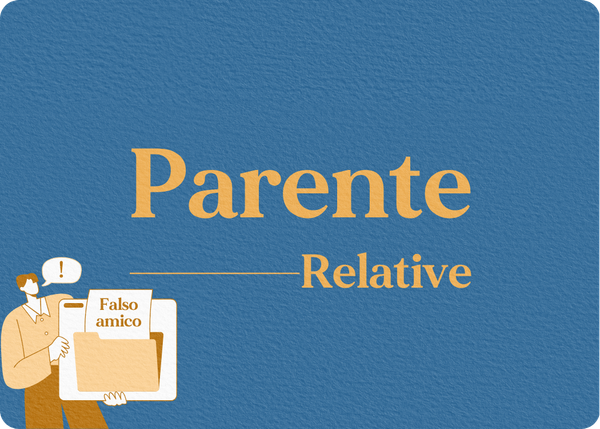Parente
NOUN [masculine or feminine]
Meaning and English translation 🔖
Relative, Family member
🇬🇧 A person connected to another by blood relation or marriage.
🇮🇹 Persona unita ad un'altra da vincoli di consanguineità o affinità.
| Masculine ♂️ | Feminine ♀️ | |
|---|---|---|
| Singular | il - un parente | la - una parente |
| Plural | i - dei parenti | le - delle parenti |
Example sentences 💬
Ho molti parenti in Italia, ma non li vedo spesso.
I have many relatives in Italy, but I don't see them often.
La riunione di famiglia ha riunito parenti da tutto il mondo.
The family reunion brought together relatives from all over the world.
This article is brought to you by Giulia School, where you can learn Italian the natural way—with real conversations and passionate teachers guiding you every step of the journey. It’s the closest thing to immersion you can get without living in Italy. Click here to learn more.
Idioms with parente 🇮🇹
Parenti stretti
→ Close relatives
Al matrimonio inviteremo solo i parenti stretti: genitori, fratelli, nonni, zii e cugini di primo grado.
For the wedding, we'll invite only close relatives: parents, siblings, grandparents, aunts, uncles, and first cousins.
Parente alla lontana
→ Distant relative
Ho scoperto di avere un parente alla lontana in Argentina.
I discovered I have a distant relative in Argentina.
Parente acquisito
→ In-law / relative by marriage
Dopo il matrimonio di mia sorella, suo marito è diventato un mio parente acquisito.
After my sister's wedding, her husband became my relative by marriage.
Parenti serpenti
→ Relatives are snakes (idiomatic expression indicating family conflicts)
Durante la lettura del testamento, si è visto chiaramente che "parenti serpenti" non è solo un modo di dire.
During the reading of the will, it became clear that "relatives are snakes" is not just a saying.
Where does the word parente come from? 🔎
Parente comes from the Latin parens, parentis, present participle of the verb parere, meaning "to beget, to give birth". Originally, in Latin, it referred to parents, but over time, in Italian its meaning expanded to include all family members.





